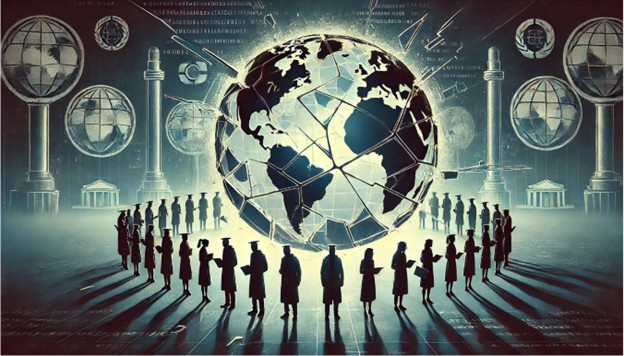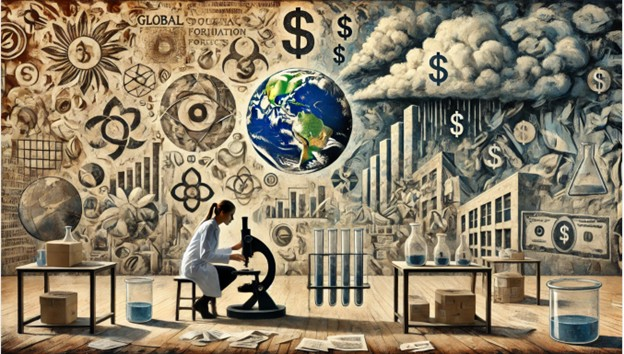Science on Trial: How Politics, Power, and Ideology Are Reshaping Global Research
Input
Modified
The Global Consequences of U.S. Funding Cuts: A Worldwide Shockwave Algorithmic Censorship: The Influence of Fear on Scientific Language Science’s Future Is On the Line

The Global Consequences of U.S. Funding Cuts: A Worldwide Shockwave
A postdoctoral researcher is conducting experiments in a tranquil laboratory at the Centre hospitalier de l'Université de Montréal, despite the possibility that her research may be terminated in the near future. A scholarship program in Colombia that was intended to facilitate the transition of Indigenous and Afro-Colombian students into graduate education has been abruptly terminated. In Australia, scientists refrain from identifying the National Institutes of Health (NIH) as their funding source due to concerns regarding potential political repercussions. In the United States, the world's scientific superpower, scientists are removing the terms "climate change," "diversity," and even "biodiversity" from grant applications due to concerns that they will be blacklisted by algorithmic screening tools.
This is not merely an administrative crisis. For the global research community, this is a moment of political reckoning. A cascade of consequences has been initiated by the comprehensive executive orders issued by President Donald Trump in 2025, which are intended to reshape science policy, with a particular emphasis on climate-related research and Diversity, Equity, and Inclusion (DEI). Grants from the National Institutes of Health (NIH), USAID, and other federal agencies have been suspended or redirected, totaling billions of dollars. Universities have initiated the process of censoring their own discourse. Additionally, global partnerships are unraveling in silence.

Algorithmic Censorship: The Influence of Fear on Scientific Language
However, this crisis did not commence in 2025. It is the result of a series of long-standing disputes regarding the funding of science, the direction of its development, and the consequences of ideology prevailing over evidence.
The abrupt and dramatic shift in U.S. science policy has caused research institutions worldwide to scramble since January 2025. The NIH, which has been regarded as the gold standard in biomedical funding for a long time, has discreetly commenced the issuance of "stop work" orders on active grants, with a particular emphasis on those that are associated with DEI, public health disparities, gender identity, and climate resilience.
At the University of Cape Town in South Africa, there were more than 140 NIH-funded initiatives that were impacted, with a total estimate of over $150 million. These encompassed clinical research on regenerative medicine, maternal health, and infectious diseases. In Colombia, universities such as the Universidad Nacional de Colombia and Pontificia Universidad Javeriana saw the cessation of USAID-funded peace-building and environmental programs. This included rural development initiatives that were associated with Colombia's fragile post-war recovery. Internships and research institutes that collaborated with peasant communities were eliminated as a result of a $17 million loss at a single university.
The Merit and Needs-Based Scholarship Programme in Pakistan was dismantled as a result of USAID's budget adjustments. This program had provided funding to nearly 5,000 low-income university students over the course of two decades. Women comprised fifty percent of the recipients. Top research universities in Australia, including the University of Melbourne and Sydney, experienced the freezing of NIH grants totaling more than $20 million, with the majority of these grants declining without explanation.
Even after the U.S. federal courts issued a temporary restraining order against certain NIH administrative cuts, universities received conflicting directives. Wendy Hensel, the President of the University of Hawaii, confirmed that certain agencies continued to issue halt orders, requiring compliance with Trump's executive orders prior to the release of funds.
Collaborations with U.S.-anchored initiatives were either halted or cut back by researchers in dozens of countries. Some scientists, in anticipation of retaliation or funding loss, disclosed their identities to the media. Others received ambiguous surveys from U.S. agencies, which inquired about the alignment of their research with American "interests," the recognition of only two genders, and the avoidance of "environmental justice" frameworks. The frigid sensation was tangible.

Science’s Future Is On the Line
The impact has been similarly disorienting within the United States. Universities began issuing cautious guidance across campuses: "Avoid using DEI-related terms until further notice." "Refrain from submitting grant applications that mention climate change without prior review." In certain instances, the term "biodiversity" was identified as potentially hazardous.
A professor who was conducting research on urban climate adaptation at a prominent U.S. research university was advised to eliminate references to "climate vulnerability" and "greenhouse gas emissions" from grant proposals. His funding was provided by the Department of Transportation; however, political caution prevailed over academic integrity. "It is as though the entire higher education system has been struck by a wrecking ball," he stated.
Grants are not the sole source of anxiety. Researchers are currently concerned that their careers may be endangered by publications, conference presentations, and public outreach. It has been reported that certain institutions have initiated the process of training faculty members on how to avoid politically sensitive language. This is not due to scientific risk, but rather to political optics.
And that anxiety is spreading globally. Dr. Madeleine Durand and Dr. Julie Bruneau, Canadian researchers at CHUM, observed that their subgrants from U.S. institutions such as Columbia University were unexpectedly canceled. Bruneau's randomized trial on healthcare access for individuals who inject drugs was terminated shortly after her team collected blood samples for HIV and hepatitis C. Twelve graduate students were compelled to seek alternative assignments.
Senator Ted Cruz released a database of 3,400 NSF-funded projects, designating them as promoting "neo-Marxist class warfare," which is perhaps the most alarming development. Grants were delineated into categories such as "social status," gender, ethnicity, and environmental justice. The list has had a chilling effect, despite not being officially associated with funding cutbacks. The current question that researchers are contemplating is: Will we be the next?
Who is responsible for funding scientific research, and who determines what is considered important?
An older question rests at the root of this crisis: Who determines the course of scientific inquiry? Historically, the response was frequently a combination of the state, affluent patrons, and religious institutions. The Catholic Church and the Medici family funded Galileo's discoveries. The British navy and private family fortune provided support for Darwin's voyage.
Currently, the funding of science is provided by:
- Government agencies (like NIH, NSF, and USAID)
- Private corporations (especially in pharmaceuticals and tech)
- Nonprofits and foundations (like the Packard Foundation)
- You — through taxes, purchases, and charitable giving
The private funding of the majority of clinical drug trials in the United States—approximately 75%—has led to concerns regarding bias. Research that is funded by corporations is more likely to yield favorable results for their products. The claims of the sponsor are typically validated by nutrition studies that are financed by food companies. Nevertheless, these investigations continue to be indispensable. Innovation is facilitated by industry support, which replaces the gaps left by limited public funds. The genuine concern is not the identity of the payers, but rather the extent of their influence and the extent to which their agendas distort scientific knowledge.
Trump's actions have effectively exposed this tension. The administration has altered the scope of science by linking funding to ideology, which includes the abolition of DEI, the cancellation of climate programs, and the suspension of research related to gender identity.
Academic leaders and legal scholars are issuing a warning. Richard Gold of McGill University observes that numerous research laboratories are reliant on a combination of grants from various sources. Researchers are being compelled into an impossible ethical and practical position if U.S. grants mandate the exclusion of diversity frameworks, while Canadian or EU grants require them.
The outcome? An increasing number of scientists are reevaluating their futures. There are individuals who are contemplating the possibility of permanently departing the United States. Gordon Petty, a neuroscience postdoc, is among those who are concerned that they will not have employment in the near future. "Everyone I converse with is inquiring as to whether there is still a viable career path for scientists," he stated.
The narrative of science has consistently been one of resistance—against the constraints of human knowledge, dogma, and ignorance. However, this conflict has seldom arisen from within the system that finances and sustains it.
The current situation is not merely a reorganization of funding. It is the result of a political ideology-driven restructuring of science that is enforced by bureaucratic fiat. Research that does not align with a limited definition of American values is being defunded, erased, or censored. The world is losing a generation of knowledge, progress, and global cooperation as a result.
Nevertheless, science has faced more severe challenges. The pursuit of truth has previously endured authoritarianism, from Galileo's trial to Soviet censorship. It will be able to resurrect—but only if the public, researchers, institutions, and funders decline to accept silence as a form of safety.
Science is not merely a collection of words in a proposal or data on a spreadsheet. It is a dedication to inquiry, to doubt, and to the act of discovery—even when the answers are unfavorable.
We do not merely lose research if that comes to an end. Our compass is lost.





















